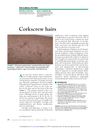Search
for
Sort by
Research
870-900 / 968 resultsresearch Clinical Study of Patients with Female Pattern Hair Loss Over a 10-Year Period
Treating underlying metabolic and hormonal issues is key to managing female hair loss.

research Index of Suspicion: Hair Loss and Parasitic Infections
The document says that hookworms are treated with mebendazole and stress-related hair loss usually gets better in 6 months, while other hair loss types have specific treatments.

research Female Pattern Hair Loss
Hair loss in women is genetic, diagnosed by examination and biopsy, and treated with minoxidil, finasteride, or transplantation.

research BMI and Levels of Zinc, Copper in Hair, Serum, and Urine of Turkish Male Patients with Androgenetic Alopecia
Lower hair zinc and copper levels found in Turkish males with hair loss; higher BMI linked to less hair zinc.

research BH07: Testosterone Deficiency in Men with Female Pattern Hair Loss
Low testosterone levels may contribute to female pattern hair loss in men.

research Metabolic and Functional Alterations Associated with COVID-19
Lower LDL-c levels predict higher COVID-19 mortality.

research Corkscrew Hairs in a 22-Year-Old Woman with Mild Systemic Lupus Erythematosus
The woman has scurvy and needs more vitamin C.

research Inherited Epidermolysis Bullosa: Clinical and Therapeutic Aspects
The document concludes that inherited epidermolysis bullosa is a challenging genetic condition requiring multidisciplinary care and new treatments.

research Atypical Scurvy Associated with Anorexia Nervosa
A woman with anorexia improved significantly after being treated for scurvy with vitamin C, despite not showing typical scurvy symptoms.

research Cardiovascular Disease-Associated Skin Conditions
Some skin conditions may increase the risk of heart disease, and understanding their connection could lead to better treatments.

research Updated Review of Treatment for Female Androgenetic Alopecia
Minoxidil is the only FDA-approved treatment for female hair loss, with other potential treatments needing more research for effectiveness.
research Beyond Expectations: The Role of Keratin Intermediate Filament Proteins in Epidermal Integrity
Keratin proteins are crucial for healthy skin, but mutations can cause skin disorders with no effective treatments yet.

research Dystrophic Anagen Effluvium Occurring During Pegylated Interferon-α-2a/Ribavirin Therapy
A woman's hair loss during Hepatitis C treatment with PEG-INF-a-2a and Ribavirin was reversible after stopping the medication.

research Alopecia Areata: A Review on Diagnosis, Immunological Etiopathogenesis, and Treatment Options
The document concludes that while there are various treatments for Alopecia Areata, there is no cure, and individualized treatment plans are essential due to varying effectiveness.

research Mouse Hair Cycle Expression Dynamics Modeled as Coupled Mesenchymal and Epithelial Oscillators
The study concluded that hair growth in mice is regulated by a stable interaction between skin cell types, and disrupting this can cause hair loss.

research Discovery of Genes and Proteins Possibly Regulating Mean Wool Fibre Diameter Using cDNA Microarray and Proteomic Approaches
Researchers identified genes and proteins that may influence wool thickness in sheep.

research Evaluation of Adding Platelet-Rich Plasma to Combined Medical Therapy in Androgenetic Alopecia
Adding platelet-rich plasma improves hair density and thickness in androgenetic alopecia.

research Inherited Epidermolysis Bullosa: A Clinical Case
A 37-year-old male with severe skin and internal issues has a rare inherited skin condition called dystrophic epidermolysis bullosa.

research Clinical and Molecular Features in a Cohort of Middle Eastern Patients With Epidermolysis Bullosa
Middle Eastern patients with epidermolysis bullosa show specific genetic mutations linked to different types of the disease.

research Role of Ferritin, Vitamin D, and Thyroid Dysfunction in Telogen Effluvium Among the Hospital Population in Western Saudi Arabia: A Case-Control Study
Low ferritin, vitamin D deficiency, and thyroid problems may contribute to hair loss in some hospital patients in Western Saudi Arabia.
research Prospective Controlled Study Evaluating Pull Test with Correlation of Serum Iron, Ferritin, Transferrin, Vitamin B12, and Folic Acid in Patients with Alopecia in the Czech Republic
Hair health can indicate mental and general health.

research Telogen Effluvium and Associated Incidence of Abnormal Serum Ferritin, Zinc, 25-Hydroxy Vitamin D, and Thyroid-Stimulating Hormone
Vitamin D deficiency is common in temporary hair loss, and stress is often a suspected cause.

research Efficacy of Oral Iron Supplementation in Treating Female Pattern Hair Loss with Low Serum Ferritin: A Pilot Study
Taking iron pills does not improve hair loss treatment in women with low iron compared to using minoxidil alone.

research Vitamin and Mineral Deficiencies in Patients With Telogen Effluvium: A Retrospective Cross-Sectional Study
People with Telogen Effluvium often lack vitamin D, ferritin, and zinc.
research Impact of Laboratory Workup and Supplementation on Alopecia Patients: A Single-Center Retrospective Chart Review
Vitamin supplements may not improve hair thickness or density in patients with non-scarring hair loss.

research Clinical, Laboratory, and Trichoscopic Features of Pediatric Androgenetic Alopecia: A Retrospective Analysis in 133 Patients
Pediatric androgenetic alopecia is linked to obesity, family history, hormonal imbalances, and requires personalized treatment including managing comorbidities.

research Shedding Low Yield Testing for Telogen Effluvium: A Cross-Sectional Study of Laboratory Results from Newly Diagnosed Patients
Most lab tests for patients with Telogen effluvium, a type of hair loss, show no or mild abnormalities; only a few specific tests are useful.

research Etiology, Management, and Outcomes of Pediatric Telogen Effluvium: A Single-Center Study in the United States
Most children with rapid hair loss had a known cause, with stress and illness being top triggers, and treatments showed similar improvement.

research Some Thoughts: Scattered Hair and There!
Dr. Shyam B Verma encourages more scientific research on hair disorders and criticizes the unscientific hair care market in India.